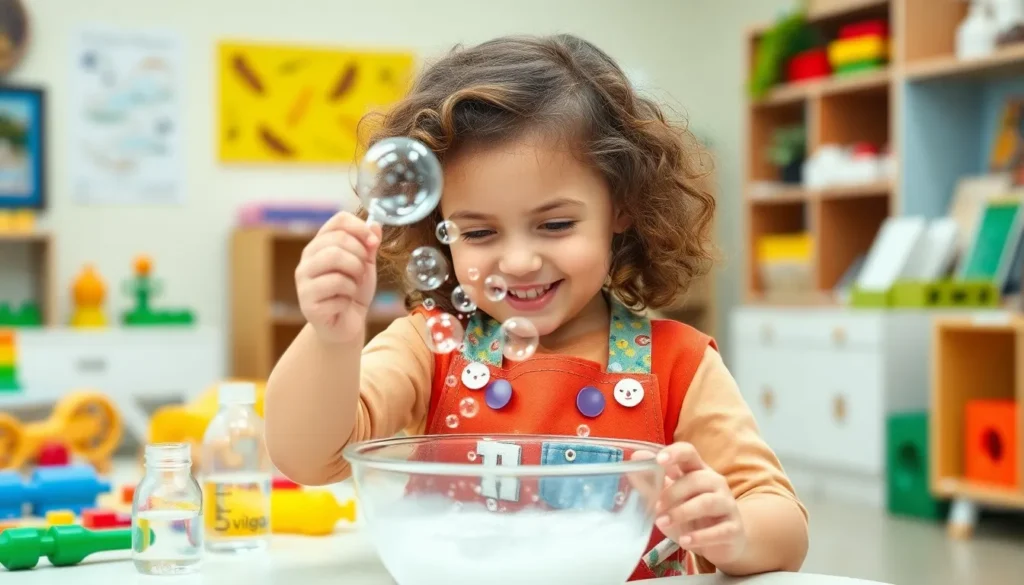Table of Contents
ToggleIn a world where toddlers can already navigate tablets better than most adults, it’s time to give them the tools to explore beyond swiping and tapping. STEM learning for preschoolers isn’t just about science, technology, engineering, and math; it’s about turning little ones into curious explorers who can ask questions and solve problems like mini Einsteins.
Understanding STEM Learning for Preschoolers
STEM learning for preschoolers emphasizes developing foundational skills in science, technology, engineering, and math. Curiosity plays a crucial role in this approach, encouraging children to explore their surroundings actively. Engaging in hands-on activities fosters creativity while allowing preschoolers to ask questions and seek answers.
Focusing on interactive experiences enhances problem-solving skills in young children. For instance, simple experiments, such as mixing vinegar and baking soda, demonstrate chemical reactions and excite interest. Integrating technology through age-appropriate digital tools can also support STEM learning. Apps designed for young learners can offer engaging math puzzles or encourage early coding skills.
Introducing engineering concepts, children can engage in building structures with blocks or recyclable materials. Activities that involve construction challenge them to think critically and work collaboratively with peers. Mathematics skills naturally arise from sorting objects, counting, and recognizing patterns during play.
Research supports that early exposure to STEM concepts contributes to increased confidence in these subjects later. According to the National Science Foundation, children who participate in STEM-related activities may show improved academic performance as they advance through school. Understanding the importance of these skills in everyday life helps children connect learning with real-world applications.
Maintaining a balance between structured activities and child-led exploration is essential. Encouraging preschoolers to pursue their interests in science and technology allows for personalized learning experiences. These experiences cultivate an early fascination with STEM fields, paving the way for lifelong learning.
Importance of STEM Learning in Early Childhood

STEM learning plays a critical role in the early development of preschoolers. Engaging in these activities fosters essential skills that support lifelong learning.
Cognitive Development Benefits
Cognitive development flourishes through hands-on STEM experiences. Exploring science and math concepts enhances critical thinking skills. Participating in simple experiments like mixing vinegar and baking soda encourages hypothesis formation and experimentation. Exposure to educational technology supports early math skills and problem-solving abilities. Developing reasoning skills occurs naturally when children investigate cause and effect in their activities. Research shows that foundational STEM skills correlate with higher academic performance in later grades. Ultimately, engaging with these educational concepts builds confidence, curiosity, and a love for learning in young children.
Social Skills Enhancement
Social skills improve significantly through collaborative STEM projects. Working together on building activities fosters teamwork and communication. Sharing ideas during experiments encourages children to respect others’ opinions and develop empathy. Participating in group problem-solving activities helps preschoolers learn conflict resolution and negotiation skills. Engaging in STEM projects provides opportunities for peer interaction, boosting social awareness and adaptability. Research indicates that children with strong social skills excel academically. Hence, integrating STEM learning into preschool curriculums not only nurtures academic growth but also enhances social competencies vital for future success.
Effective STEM Activities for Preschoolers
Effective STEM activities engage preschoolers, promoting curiosity in science, technology, engineering, and math. The right tasks stimulate children’s problem-solving abilities while making learning enjoyable.
Hands-On Experiments
Hands-on experiments captivate preschoolers’ attention and enhance their understanding of scientific concepts. Mixing vinegar with baking soda creates an exciting reaction, turning learning into an adventure. Building simple structures with blocks allows children to explore engineering principles. Encouraging them to observe changes during these activities fosters critical thinking skills. Introducing concepts like sinking and floating through water play deepens their grasp of physics. Each experiment provides opportunities for children to ask questions and develop a scientific mindset.
Interactive Games
Interactive games foster collaborative learning in preschoolers while teaching foundational STEM skills. Digital games focused on counting enhance early math abilities through engaging interfaces. Sorting and matching activities encourage pattern recognition and logical thinking. Playing coding games on tablets introduces basic programming concepts in a playful manner. Group scavenger hunts promote teamwork and exploration of scientific ideas. Every game not only entertains but also builds essential skills, preparing children for future academic challenges.
Incorporating STEM Learning at Home
Incorporating STEM learning at home fosters curiosity and exploration in preschoolers. Parents can start with simple science experiments using everyday household items. Mixing vinegar and baking soda creates an exciting and interactive way to illustrate chemical reactions. Engaging kids in this activity helps them understand scientific concepts while having fun.
Using building toys like blocks encourages engineering skills. Preschoolers can create various structures, developing spatial awareness and creative problem-solving abilities. Families might also explore nature during outdoor play, identifying plants and animals. Discussing these observations strengthens both science knowledge and vocabulary.
Technology integration provides additional resources for teaching STEM. Educational apps that focus on math or coding skills allow children to learn while enjoying digital interaction. Selecting interactive games helps reinforce concepts in an entertaining format.
Sorting toys by color or size promotes mathematical skills through everyday tasks. Parents can challenge kids with activities like counting fruits while preparing snacks. Recognizing patterns in nature or household items also enhances mathematical reasoning.
Balancing structured activities with free play supports child-led exploration. Allowing kids to choose their STEM activities cultivates enjoyment in learning. Encouraging this independence nurtures a lasting interest in science, technology, engineering, and math.
Collaborative projects at home reinforce social skills. Working together on a DIY project fosters communication and teamwork. These experiences not only strengthen relationships but also teach critical thinking through group problem-solving. Engaging preschoolers in hands-on learning helps prepare them for future academic challenges, emphasizing the value of STEM education from a young age.
Resources for Educators and Parents
Many resources exist to support educators and parents in fostering STEM learning for preschoolers. Organizations like the National Association for the Education of Young Children (NAEYC) offer guidelines for integrating STEM into early childhood education. Workshops and training sessions provided by these organizations equip teachers with effective strategies.
Books specifically focused on STEM concepts can enhance understanding too. Titles such as “The Everything Kids’ Science Experiments Book” engage young learners with fun activities. Parents often benefit from utilizing books that provide structured experiments tailored for home use.
Online platforms also serve as valuable tools. Websites like PBS Kids and National Geographic Kids deliver engaging activities that promote STEM skills. These platforms often include videos and interactive games, making learning enjoyable and accessible.
Local libraries frequently host hands-on STEM workshops, providing opportunities for children to participate in collaborative projects. Libraries might also feature STEM kits available for checkout, containing materials for experiments and building activities.
Community resources play an important role in STEM education as well. Many museums offer exhibits specifically designed for young children, allowing them to explore scientific concepts firsthand. Local science fairs can inspire preschoolers to get involved, introducing them to project-based learning early on.
Educational apps serve as an engaging method for teaching math and coding. Options like ScratchJr and Mathseeds make learning interactive, integrating technology seamlessly. Parents often use these apps to reinforce classroom lessons at home while keeping children entertained.
Utilizing these diverse resources effectively cultivates a strong foundation in STEM. Prioritizing hands-on, engaging experiences fosters curiosity and problem-solving skills in preschoolers.
Embracing STEM learning in preschool lays the groundwork for a child’s future success. By introducing hands-on activities and encouraging exploration parents and educators can ignite a passion for science technology engineering and math. This approach not only enhances critical thinking and problem-solving skills but also nurtures social abilities through collaborative projects.
Utilizing everyday resources and balancing structured learning with child-led exploration fosters a rich environment for curiosity. As preschoolers engage in STEM experiences they build confidence and a lasting interest in these vital fields. Investing in early STEM education ensures children are well-prepared for the challenges and opportunities that lie ahead.




